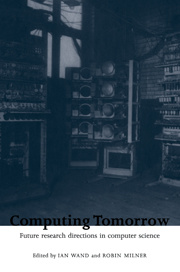Description
Computing Tomorrow
Future Research Directions in Computer Science
Coordinators: Wand Ian, Milner Robin
Collection of essays dealing with the future of computer science as a research subject.
Language: English
Subject for Computing Tomorrow:
Publication date: 03-2009
384 p. · 15.2x22.9 cm · Paperback
384 p. · 15.2x22.9 cm · Paperback
Description
/li>Contents
/li>
First published in 1996, this collection of essays by distinguished computer scientists celebrates the achievements of research and speculates about the unsolved problems in computer science that require future investigation. Since the subject stretches from technology in the field, through engineering design to foundations in mathematics, there is a wide variety of concerns and approaches among the authors. The book's purpose is to show that long-term research in computer science is crucial and that it must not be driven solely by commercial considerations. The authors do not shirk the difficult aspects of their topics, but try to expose them in the simplest terms possible without diluting them, in order that the reader can understand the issues involved. Thus the book also represents a broad overview of much of the state of knowledge and future expectations of computer science, illustrating that it is much more than a technology and it is a fully fledged and growing intellectual discipline with its own engineering principles and its own scientific concepts and models. It will be stimulating reading because it represents the views of prominent authorities who have had a significant impact on the direction of innovation, research and development in computer science.
Preface; Contributors; 1. The complexity of algorithms M. D. Atkinson; 2. Building novel software: the researcher and the marketplace P. J. Brown; 3. Prospects for artificial intelligence Alan Bundy; 4. Structured parallel programming: theory meets practice John Darlington, Yi-ke Guo and Hing Wing To; 5. Computer science and mathematics J. H. Davenport; 6. Paradigm merger in natural language processing Gerald Gazdar; 7. Large databases and knowledge reuse P. M. D. Gray; 8. The global-yet-personal information system J. R. Gurd and C. B. Jones; 9. Algebra and models C. A. R. Hoare; 10. Real-time computing Mathai Joseph; 11. Evaluation of software dependability Bev Littlewood; 12. Engineering safety-critical systems John A. McDermid; 13. Semantic ideas in computing Robin Milner; 14. Computers and communications R. M. Needham; 15. Interactive computing in tomorrow's computer science William Newman; 16. On the importance of being the right size Simon Peyton Jones; References; Index.
© 2024 LAVOISIER S.A.S.

